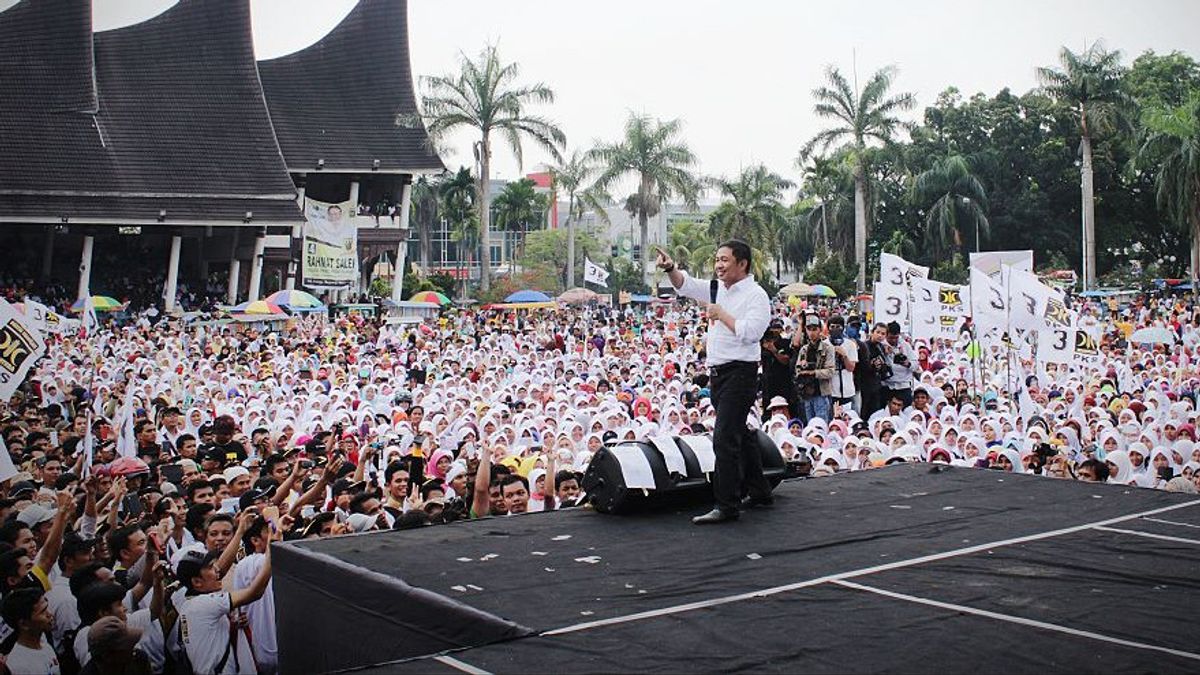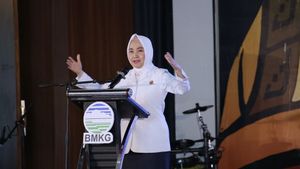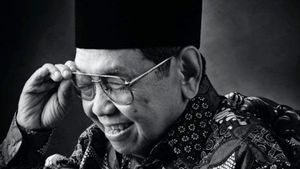JAKARTA - The Muslim Brotherhood (IM) is the largest Islamic movement in Egypt. As a mass organization, IM was founded by Hassan Al-Banna. The goal was to make the Koran and Hadith the ideology of Muslims in 1928.
In that context, IM became a tool for Egyptian fighters to be free from the shackles of British colonialism. IM was also labeled a radical. Behind it all, IM's struggle was adopted by many countries in the world, including Indonesia.
IM proved that religion and politics can go hand in hand. At first, Hassan Al-Banna founded a limited IM in terms of spreading Islamic values. In his view, Islam is a comprehensive way of life.
For this reason, Hassan Al-Banna often criticized the previous Islamic scholars because they only applied Islam in pieces. Whereas Islam thoroughly discusses matters of faith, sharia, din (religion), and Daula (state).
Or as Hassan Al-Banna often said: The most important thing for us is Islam, whatever the dress.

Hassan Al-Banna with a number of Middle Eastern scholars (Source: Commons Wikimedia)
His men, Hassan Al-Banna and his six friends founded the IM. They are Hafidh Abdul Hamid (carpenter), Ahmad Al Khushari (barber), Fuad Ibrahim (tax collector), Abdurrahman Hasbullah (driver), Ismail Izz (garden), and Zaki Al Maghribi (cartridge).
The purpose of establishing IM is to make the Qur'an and Hadith the ideology of Muslims. Indirectly, the movement expanded to become the main center of Egypt's resistance from the shackles of British colonialism.
“1936 the Palestinian-Israeli conflict erupted. The Ikhwan Al Muslimun (Ikhwanul Muslimin) called for resistance to defend the rights of the Palestinian people. The Ikhwan immediately ignited the patriotism and nationalism of Arab countries," wrote a Tempo Magazine report entitled Jalan Berduri Ikhwan Al-Muslimun (2001).
"In addition, the Ikhwan congregation always reads the Qunut prayer for Palestine in every obligatory prayer in order to get convenience and help from the Creator. This prayer was also used by the Al-Muslim Brotherhood to expel the British from the land of Egypt," continued the report.
Muslim Brotherhood and Indonesia
In addition, Hassan Al-Banna is known to often throw ideas related to the renewal of the principles of an Islamic state in Egypt. Even Hassan Al-Banna has twice tried to sit in the Egyptian parliament seat in 1942-1944.
The effort was made by Hassan Al-Banna as a step to liberate Egypt from foreign powers that do not care about Islamic principles. Based on that, IM's influence was so great, including pushing Egypt to become the first country to recognize Indonesia's independence.
Support for Indonesia is given in accordance with Hassan Al-Banna's anti-colonial principles. Moreover, IM was one of the actors in the birth of Lajnatud Difa'i'an Indonesia (Indonesian Defenders Committee), an organization that garnered support from the Egyptian people for Indonesian independence.
In this regard, Hassan Al-Banna himself welcomed the representatives of Indonesia, Sutan Syahrir and Haji Agus Salim when they visited Egypt seeking support on October 16, 1945. This is because Indonesia itself is a country with the largest Muslim population in the world.
"As in the case of Western society, which is more inclined to the development of physical elements in the order of life, this is not desired by Islam," Hassan Al-Banna said, quoted by Hafniati in Hasan Al-Banna's book Moderation of Da'wah in the Development of Islamic Society in Indonesia (2020). .
"As for us, said Al-Banna, we believe that on the shoulders of every Muslim there is a great mandate to sacrifice all his life, blood and property in order to guide mankind towards the light of Islam."
"From this, we get an idea that the purpose of a Muslim's life is not only limited by a certain region (region), but on a broader scale is for all mankind," he added.
Understanding the Muslim Brotherhood in PKS
After overwhelming support for Indonesian independence, in the 1980s and 1990s IM began to exert its influence on the domestic Islamic movement. This influence was brought about by the hectic halaqah (recitation) movement on Indonesian campuses, which adopted many of the IM movement and education methods.
Initially at state universities, such as the University of Indonesia, the Bandung Technical Institute, and the Bogor Agricultural Institute, it has expanded to private universities and various academies. The campus Islamic movement then gave birth to the Justice Party (PK). PK later developed into the Prosperous Justice Party (PKS).
The establishment of the PKS in July 1998 was assisted by many IM figures from Egypt and the Middle East. As a result, PKS became a form of appearance for the Indonesian branch of IM, with the main goal of making the political stage a pulpit for da'wah.
“The main goal for PKS internally is to turn the political stage into a da'wah pulpit. Even though it seems very utopian, because the Islamist movement perceives that the political aspect is the most crucial aspect, where politics is an area that greatly determines the good and bad of society, the progress and decline of the nation, as well as the prosperity and misery of the people," wrote Elia Tambunan in the book Islamism. : A Plot of Egypt, Pakistan and Indonesia (2019).
Furthermore, the former Secretary General of PKS Anis Matta admitted that IM's inspirations were absorbed by his party in two dimensions at once. First, ideological inspiration, one of which is present in the principle of syumuliyat al-Islam (Islamic universality).

This was not only the principle of Hasan Al-Banna's struggle, but also other fighters. Second, historical inspiration, a kind of looking for a model of a form of Islamic struggle in the era after the fall of Al-Khilafah Al-Islamiyah and the domination of Western imperialism over Muslim countries.
"But what brings together these two inspirations in Hasan Al-Banna and Ikhwan Al-Muslimun, is the aspect of the pulse of their movement. Because, when the other characters become reformers in the scope of thought."
"Hasan Al-Banna succeeded in transforming the reform from a discourse into a movement. And it is not an exaggeration, if the inspiration for that movement can also be felt in the pulse of the Prosperous Justice Party," Anis Matta, quoted by Abd. Halim in the book Relation of Islam, politics & power (2013).
*Read other information about POLITICS or read other interesting articles from Detha Arya Tifada.
Other MEMORIESThe English, Chinese, Japanese, Arabic, and French versions are automatically generated by the AI. So there may still be inaccuracies in translating, please always see Indonesian as our main language. (system supported by DigitalSiber.id)












